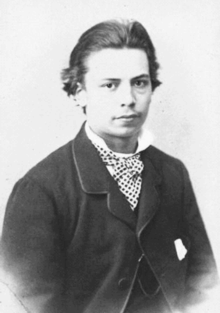Philipp Mainländer
| Philipp Mainländer | |
|---|---|
 |
|
| Born | October 5, 1841 Offenbach am Main, Grand Duchy of Hesse |
| Died | April 1, 1876 (aged 34) Offenbach am Main, Grand Duchy of Hesse |
| Era | 19th century philosophy |
| Region | Western Philosophy |
| School | Philosophical pessimism |
|
Main interests
|
Metaphysics, psychology |
|
Notable ideas
|
The will to die (Wille zum Tode) |
|
Influences
|
|
|
Influenced
|
|
Philipp Mainländer (October 5, 1841 – April 1, 1876) was a German poet and philosopher. Born as Philipp Batz, he later changed his name into Mainländer from adoration for his hometown Offenbach am Main.
In his central work Die Philosophie der Erlösung (The Philosophy of Redemption) – according to Theodor Lessing "perhaps the most radical system of pessimism known to philosophical literature" – Mainländer proclaims that life is absolutely worthless, and that "the will, ignited by the knowledge that non-being is better than being, is the supreme principle of morality."
Born in Offenbach on October 5, 1841 "as a child of marital rape", Philipp Mainländer grew up the youngest of six siblings.
In 1856, at his father's instruction, Mainländer entered the commercial school of Dresden to become a merchant. Two years later, he was employed in a trading house in Naples, Italy, where he learned Italian and acquainted himself with the works of Dante, Petrarca, Boccaccio, and – most notably – Leopardi. Mainländer would later describe his five Neapolitan years as the happiest ones of his life.
During this critical period of his life, Mainländer discovered Arthur Schopenhauer's central work The World as Will and Representation. Nineteen years old at the time, he would later describe the event as a penetrating revelation, referring to the month of February 1860 as the "most important of [his] life". Indeed, Schopenhauer would remain the most important influence on Mainländer's later philosophical work.
In 1863, Mainländer returned to Germany to work in his father’s business. In the same year, he also penned the three part poem Die letzten Hohenstaufen ("The Last Hohenstaufens"). Two years later, on October 5, Mainländer’s 24th birthday, his mother died. Deeply affected by this experience of loss, Mainländer began an ongoing turn away from poetry and towards philosophy. During the following years, he studied Schopenhauer, Kant – "not poisoned through Fichte, Schelling and Hegel, but rather critically strengthened through Schopenhauer")", Eschenbach's Parzival, and the classics of philosophy from Heraclitus to Condillac.
...
Wikipedia
